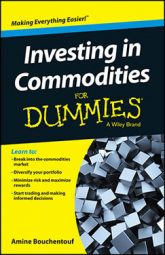One route you can take to get exposure to commodities is to buy stocks of commodity companies. These companies are generally involved in the production, transformation, or distribution of various commodities.
This route is perhaps the most indirect way of accessing the commodity markets because, in buying a company's stock, you're getting exposure not only to the performance of the underlying commodity that the company is involved in, but also other factors, such as the company's management skills, creditworthiness, and ability to generate cash flow and minimize expenses.
Publicly traded companies
Publicly traded companies can give you exposure to specific sectors of commodities, such as metals, energy, or agricultural products. Within these three categories, you can choose companies that deal with specific methods or commodities, such as refiners of crude oil into finished products or gold-mining companies. If you're considering an equity stake in a commodity company, you need to determine how the company's stock performs relative to the price of the underlying commodity that company is involved in.
There's a relatively strong correlation between the performance of commodity futures contracts and the performance of companies that use these commodities as inputs. So investing in the stock of commodity companies actually gives you pretty good exposure to the underlying commodities themselves. However, you want to be extra careful and to perform thorough due diligence before you invest in these companies.
Master limited partnerships
Master limited partnerships (MLPs) are a hybrid instrument that offers you the convenience of trading a partnership like a stock. You get the best of both worlds: the liquidity that comes from being a publicly traded entity and the tax protection of being a partnership.
A big advantage of MLPs is that, as a unit holder, you are taxed at only the individual level. This structure is different than if you invest in a corporation, because cash back to shareholders (in the form of dividends) is taxed at both the corporate level and the individual level. MLPs don't pay any corporate tax, which is a huge benefit for your bottom line.
For an MLP to qualify for these tax breaks, it must generate 90 percent of its income from qualifying sources that relate to commodities, particularly in the oil and gas industry.

